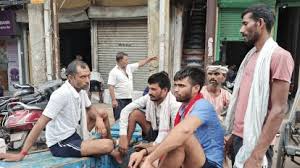‘How will I prove who I am and where I am from?’ Bihar migrants in Delhi are worried

As Delhi heads into a critical election cycle, thousands of Bihar-born migrant workers living in the capital are increasingly anxious. The Election Commission’s ongoing verification of electoral rolls has triggered confusion and fear among these daily wage earners and laborers. Their main concern is simple: “How will I prove who I am and where I am from?”
For many, this question isn’t just about documentation—it’s about their democratic rights. Despite contributing to the capital’s economy through construction, domestic work, and transport services, many migrants lack basic documents that link them to Delhi.
Documents Missing, Rights at Risk
Ramesh Kumar, a construction worker who moved from Bihar’s Samastipur district five years ago, says he never imagined that his identity would become a political issue.
“My Aadhaar card still shows my Bihar village. I live in Delhi now, but I don’t have rent papers or bills in my name,” he explains. “If the government wants proof, what can I show?”
Ramesh’s story isn’t unique. Most migrants live in rented rooms or shared spaces in slums and unauthorized colonies. Landlords rarely provide tenancy papers. Without formal proof of address, thousands may lose access to voting rights in either Delhi or Bihar.
Voter Roll Revisions Spark Concern
The Election Commission’s voter roll update drive aims to remove fake or duplicate entries. But migrant workers say they are being unfairly targeted. Many have received notices asking them to prove their residence, failing which their names could be deleted from the voter list.
Civil rights organizations argue that the drive disproportionately affects poor and mobile populations. According to Priya Narayan, a volunteer at a Delhi-based voter rights group, “People who build this city are being told they don’t belong. It’s tragic.”
She adds that workers who can’t afford regular housing or digital access are the ones most at risk. Without support, many will remain voiceless in the democratic process.
Political Fallout and Warnings
The issue has stirred political debate. Leaders from Bihar, including Tejashwi Yadav, have raised serious concerns. He accused the Election Commission of creating barriers for migrant voters.
“These are the people who built Delhi brick by brick. Now they are being asked to prove they belong here. It’s deeply unfair,” Tejashwi said at a recent rally.
The Aam Aadmi Party has echoed similar concerns, calling for reforms in how migrant identities are verified. They’ve asked the Election Commission to adopt simpler processes and accept more flexible forms of documentation.
Real People, Real Struggles
For many women migrants, the problem is even more serious. Meena Devi, a domestic worker from Araria, Bihar, has lived in Delhi for ten years. She wants to shift her vote to Delhi but doesn’t know how.
“My husband and I work all day. We don’t have time to run from office to office. I don’t understand these forms. No one helps us,” she says.
Even when help is available, fear holds many back. Misinformation, language barriers, and a lack of awareness make the process harder for those already living on the margins.
An Exclusion Crisis in the Making?
The concern isn’t just about missing one election. Experts believe this may lead to long-term exclusion if not addressed quickly.
Dr. Sanjay Thakur, an electoral researcher, says, “We need to recognize internal migrants as a major voting bloc. If they lose faith in the process, voter turnout will drop in critical areas.”
He believes that documentation shouldn’t be the only way to prove identity. “Self-declarations, employer letters, or community verification should be accepted. Otherwise, you’re punishing people for being poor.”
What Can Be Done?
To prevent disenfranchisement, rights activists and policy researchers have suggested key reforms:
- Use of alternative documents like employer letters or self-declarations for proof of residence
- Special camps in migrant-dominated areas for on-the-spot registration
- Simplified forms in regional languages and mobile assistance vans
- Provisional inclusion based on verbal verification by local officials
The Election Commission has taken steps in the past, such as introducing the “migrant voter” category. But implementation remains weak, especially at the grassroots level.
Voting Rights Must Include All Citizens
India’s democracy is built on the idea that every citizen counts. But for millions of internal migrants, including those from Bihar living in Delhi, that ideal feels distant.
“Voting is my right,” says Meena. “But when everything needs a document, and I have none, how will I show I’m Indian?”
Her question reflects a wider truth. Identity in India is increasingly linked to paperwork, and those without it are often left behind.
Final Thoughts
If India wants to ensure free and fair elections, it must recognize the lived realities of its working poor. Delhi’s migrant workforce—especially those from states like Bihar—must not be treated as outsiders. They are part of the city, part of its heartbeat.
Unless voter verification becomes more humane and accessible, thousands may silently disappear from the rolls. That would not just be an administrative failure—it would be a moral one.






